International Day of Women and Girls in Science
Research today - not a men-only pursuit
Research thrives on diversity of thought, new perspectives, talent and creativity. Empa is convinced that by involving and supporting female researchers, today's greatest challenges can be addressed and solved. To mark the International Day of Women and Girls in Science, five Empa researchers whose contributions have shaped science at the national and international level will be featured.
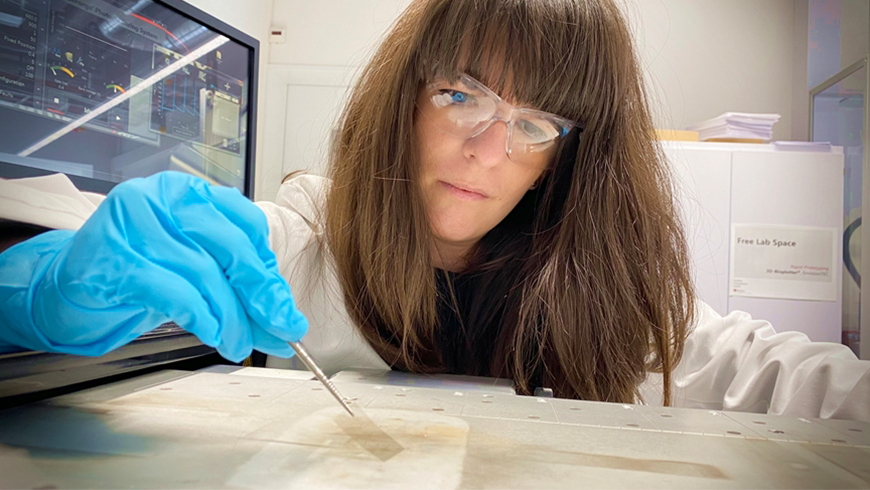
11 February marks the International Day of Women and Girls in Science. The initiative, established in 2015 by the United Nations Educational, Scientific and Cultural Organization (UNESCO), aims to encourage women and girls to consider careers in science, highlight the indispensable role of women in science and create role models for current and future generations.
Just over a quarter of Empa's scientific staff are women, a stable proportion over the last four years - with room for improvement. "Equal opportunities are an important key to outstanding research work. We are very committed to supporting our young women and motivating them not to give up their careers, even if they start a family. For the future, we are keen to enable more women to take up leadership positions," states Empa director Tanja Zimmermann. "Empa has taken numerous measures to increase the proportion of women. Programs such as Fix the leaky Pipeline or the mentoring program feM-LEAD, as well as the support of employees returning after parental leave through the Restart Support are part of this. It is a pleasure to witness so many motivated women at Empa; they are a great role model for future scientists," says Melina Spycher, Diversity and Inclusion expert at Empa, Eawag and the Paul Scherrer Institute (PSI).
Miriam Elser, Automotive Powertrain Technologies laboratory
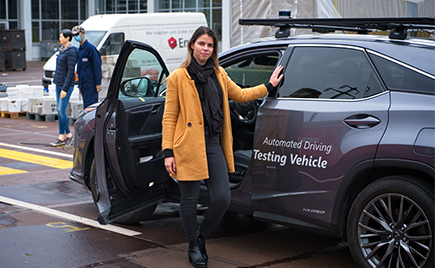
What do you like most about your work?
Above all I have always liked the versatility of my work; every day is different and filled with many interesting tasks: planning new projects, performing experiments, giving talks, etc. Of course there are also tasks that I like less, such as administrative work, but these are outweighed by the interesting activities.
Who inspired you to pursue a career in science?
I always liked science subjects at school, but it wasn't clear to me what career prospects they could open up for me, and this caused quite a bit of anxiety at the age of 17 when I had to decide on a course of study. However, my parents strongly encouraged me to pursue a major that I liked, regardless of its career prospects. So I decided to study physics, and after a PhD in air pollution, I am now leading a research group in an engineering field, something I certainly would not have imagined as a 17-year-old. But I can say with great pleasure that I have enjoyed this journey so far, and I am looking forward to the future.
What advice would you give to young women/girls?
Science jobs are creative and exciting, can be very rewarding and give you a lot of freedom to choose your research and career path. This is because the skills and knowledge you develop in the process can take you in many different directions. Working will likely be a large part of your life, so find something that you really enjoy without being limited by the system, society or other preconceptions.
What are you most proud of in your work?
I am proud that our research can contribute to mitigating the environmental and energy impacts of road traffic, improving people's quality of life and preventing premature deaths caused by air pollution.
Amy Jenelle Knorpp, High Performance Ceramics laboratory
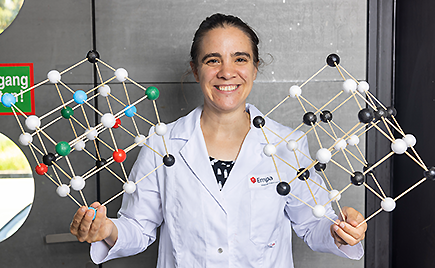
Why would you encourage girls and young women to work in science?
The many challenges that our society faces currently will require creative and holistic scientific and engineering solutions. This is an exciting time to be a part of science, and one where someone can have an important impact.
What do you particularly like about your work?
I particularly like that I get to work and collaborate with experts with similar curiosity for scientific research.
Who inspired you to pursue a career in science?
My father always encouraged me to ask why or how something worked, and he showed me that the discovery of understanding the world around us was a fun and exciting adventure. This encouragement naturally led me to be a scientist.
What advice would you give to young women/girls?
As a mom to a baby girl, I hope that I can advise her to follow her passions and keep in perspective how best to positively impact the world.
What are you particularly proud of in your work?
I am particularly proud of working with novel materials and engineering them for meaningful use in net-zero applications.
Manon Murdeu, Particles-Biology Interactions laboratory
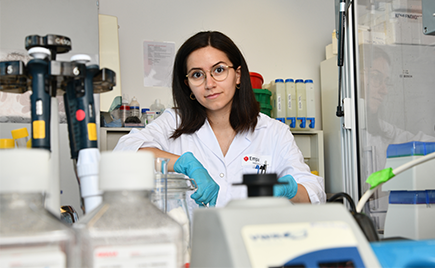
Why would you encourage girls and young women to work in science?
To actively take part in the change, to inspire and demonstrate to young women that science is not about gender but about minds, that our words and actions have a value. To explore new possibilities and break old walls that were built under prejudices. And not least, as a personal gratification to help the community – and society – by trying to answer some unsolved questions.
What do you particularly like about your work?
I can directly contribute to research regarding women's health by being part of an open-minded community, which allows me to acquire new knowledge to create a strong foundation for future scientific breakthroughs.
Who inspired you to pursue a career in science?
Since I was small I wanted to be a researcher, to be the Rita Levi Montalcini* of my time – not because of the Nobel Prize, but because of the impact she had on both society and the scientific community. Also, I was inspired by my family. And although they didn't work in a scientific environment, they inspired me to not be afraid to try new things and encouraged me to be curious and discover the unknown.
What advice would you give to young women/girls?
Get out of your comfort zone, try new things, be curious and don't be afraid to share your thoughts and ideas. You will be surprised of how a few words or a small action can change the world around us.
What are you particularly proud of in your work?
I am directly involved in women's health research and I can contribute to improving women's quality of life. I can meet and create connections with people of different backgrounds with the common goal to find solutions for a better world. I am proud of being able to talk about what is considered a taboo and try to break the barrier between science and society. Starting from my "bubble", my work and its results can expand further and create awareness of the possibilities and the power their ideas can have.
* Rita Levi Montalcini (*1909, †2012) was an Italian-born physician and neurobiologist. In 1986, she was awarded the Nobel Prize in Medicine and Physiology, together with the American biochemist Stanley Cohen, for her discoveries of important principles in neuroscience and of the nerve growth factor NGF. Montalcini was considered an icon at the time when there were almost no women in research.
Kerstin Thorwarth, Coating Competence Center
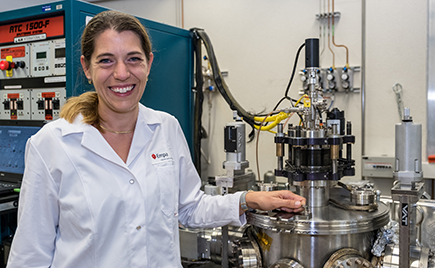
Why would you encourage girls and young women to work in science?
Working in science is incredibly multifaceted – unfortunately, you often don't realize what opportunities are open to you until you're a student. Successful research requires creativity, imagination and teamwork – and has nothing to do with the image of the lonely nerd that unfortunately still persists in people's minds.
What do you particularly like about your work?
The teamwork and the international, open and creative environment is very enriching. Without this, successful research is not possible.
Who inspired you to pursue a scientific career?
My physics teacher certainly played a major role at the time. He was an enthusiastic amateur astronomer and offered additional courses such as astronomy and chaos theory. He shared his enthusiasm for science with us and didn't teach physics as a purely academic subject. Physics is embedded everywhere.
What advice would you give to young women/girls?
It is important to get involved with new things and not to be deterred by apparent hurdles. The image of the lonely nerd is just plain wrong!
Antonia Neels, Center for X-Ray Analytics
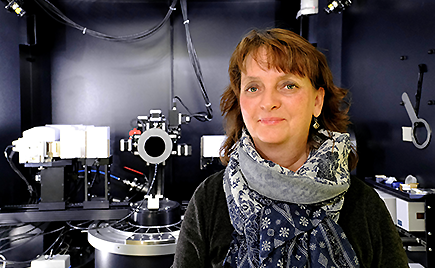
Why would you encourage girls and young women to work in science?
Science is exciting and innovative every day. Stick with it after your Master's degree and make your ideas a reality!
What do you like most about your work?
I am involved in analytical research, which is indispensable for innovations in materials science. Materials science, in turn, is enormously called on today to meet the challenges of our time in terms of environment, energy and health. It is extremely rewarding for me to work on solving these issues.
Who inspired you to pursue a career in science?
First of all, my family: my father is a chemist, my grandfather was a crystallographer. Then my teachers at school, who encouraged my scientific inclinations. Later, after my chemistry studies, my mentors at the University of Neuchâtel, CSEM and Empa motivated me enormously.
What advice would you give to young women/girls?
Stay on top of your game, pursue your goals and get advice, support and inspiration from family, friends and your professional environment!
What are you most proud of in your work?
I am particularly proud of a strong team and an open, stimulating scientific exchange.
Miriam Elser
Automotive Powertrain Technologies
Phone +41 58 765 47 74
Amy Jenelle Knorpp
High Performance Ceramics
Phone +41 58 765 60 33
Manon Murdeu
Particles-Biology Interactions Lab
Phone +41 58 765 70 37
Kerstin Thorwarth
Surface Science and Coating Technologies
Phone +41 58 765 45 47
Antonia Neels
Center for X-ray Analytics
Phone +41 58 765 45 07
-
Share






